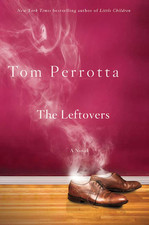I finished Tom Perotta’s novel, The Leftovers [Kindle | iBooks] this weekend, and found it to be both compelling and unsatisfying.
The book was published in 2011, and if I ever heard anything about it, I had forgotten it. But it’s recently been getting new press due to the film adaptation that is scheduled to appear sometime this year on HBO.
 The basic premise of the book is simple. Three years earlier, on October 14th to be exact, 140 million people around the world – people of all races, religions, cultures, nationalities, and other demographic affiliations – simultaneously and instantaneously disappeared. There was no warning; there was no explanation. The book follows the lives of a handful of people living in Mapleton [somewhere in America] who are trying to cope with the aftereffects of the most mystifying phenomenon in human history. And most of them are, frankly, a mess.
The basic premise of the book is simple. Three years earlier, on October 14th to be exact, 140 million people around the world – people of all races, religions, cultures, nationalities, and other demographic affiliations – simultaneously and instantaneously disappeared. There was no warning; there was no explanation. The book follows the lives of a handful of people living in Mapleton [somewhere in America] who are trying to cope with the aftereffects of the most mystifying phenomenon in human history. And most of them are, frankly, a mess.
The first thing that might come to mind when you hear this plot premise is, “well, he’s writing about The Rapture.” Nope. While the author plays around the edges of that explanation, the book is completely irreligious. [Don’t let the description of the HBO series lead you astray in this regard.] In fact, there is no attempt whatsoever to try to explain the disappearance phenomenon; it’s left to the reader’s imagination to put some context around the plight of the “survivors.” In this sense, the author is showing respect to the reader, not feeling the need to explain everything, and is confident enough to let the story lead to whatever conclusions the reader desires.
We whose faith includes a belief in the Biblical Rapture might be offended by a portrayal of something that simulates an aspect of our faith without ever honoring it, but that would be an overreaction. This is a figment of a writer’s imagination, possibly designed to provoke precisely that reaction, but more likely simply a way to stimulate our own imaginations.
I kept trying to make this into a science fiction story, but it wouldn’t cooperate, staying stubbornly grounded in typically illogical human emotions, decisions, and relationships. It’s not a book for children – there’s lot of graphic sex, and some violence, and the usual quota of bad language. But mostly there are stories of broken people who are either trying to rebuild their lives after inexplicably losing loved ones, or who have twisted off into patterns of behavior that you know won’t turn out well.
I’ve never lost a close family member to an unexpected event, let alone an unexplained one. Some of the questions the book raises are legitimately troubling. How do you live your life knowing that what happened once might happen again, and more of those you love might simply vanish? Would it be difficult to form friendships, let alone build a loving relationship?
And how do you heal when there is no possible way to bring closure to the situation? How many times have we heard the parents of missing children express a desire to know something – anything – about their kids, if only to have that closure.
In the end, however, I found that I could only pity the characters in the book, as none of them seemed to have any concept or inkling of the true nature and character of God, or the comforting truth of Scripture, or the concept of healing grace. I don’t necessarily look for this in the novels I read, but when one takes its primary cue from a phenomenon that is unique to Christianity, it’s a shortcoming that leaves me, well, unsatisfied.
Discover more from The Fire Ant Gazette
Subscribe to get the latest posts sent to your email.
